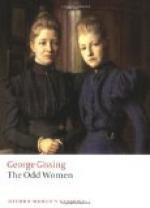In the meantime a threatening cloud had passed from the sun; warm rays fell upon the street and its clamorous life. Virginia felt tired in body, but a delightful animation, rarest of boons, gave her new strength. She walked into Trafalgar Square and viewed it like a person who stands there for the first time, smiling, interested. A quarter of an hour passed whilst she merely enjoyed the air, the sunshine, and the scene about her. Such a quarter of an hour—so calm, contented, unconsciously hopeful—as she had not known since Alice’s coming to London.
She reached the house by half-past one, bringing in a paper bag something which was to serve for dinner. Alice had a wretched appearance; her head ached worse than ever.
‘Virgie,’ she moaned, ‘we never took account of illness, you know.’
‘Oh, we must keep that off,’ replied the other, sitting down with a look of exhaustion. She smiled, but no longer as in the sunlight of Trafalgar Square.
’Yes, I must struggle against it. We will have dinner as soon as possible. I feel faint.’
If both of them had avowed their faintness as often as they felt it, the complaint would have been perpetual. But they generally made a point of deceiving each other, and tried to delude themselves; professing that no diet could be better for their particular needs than this which poverty imposed.
‘Ah! it’s a good sign to be hungry,’ exclaimed Virginia. ’You’ll be better this afternoon, dear.’
Alice turned over ‘The Christian Year,’ and endeavoured to console herself out of it, whilst her sister prepared the meal.
CHAPTER III
AN INDEPENDENT WOMAN
Virginia’s reply to Miss Nunn’s letter brought another note next morning—Saturday. It was to request a call from the sisters that same afternoon.
Alice, unfortunately, would not be able to leave home. Her disorder had become a feverish cold—caught, doubtless, between open window and door whilst the bedroom was being aired for breakfast. She lay in bed, and her sister administered remedies of the chemist’s advising.
But she insisted on Virginia leaving her in the afternoon. Miss Nunn might have something of importance to tell or to suggest. Mrs. Conisbee, sympathetic in her crude way, would see that the invalid wanted for nothing.
So, after a dinner of mashed potatoes and milk (’The Irish peasantry live almost entirely on that,’ croaked Alice, ’and they are physically a fine race’), the younger sister started on her walk to Chelsea. Her destination was a plain, low roomy old house in Queen’s Road, over against the hospital gardens. On asking for Miss Nunn, she was led to a back room on the ground floor, and there waited for a few moments. Several large bookcases, a well-equipped writing-table, and kindred objects, indicated that the occupant of the house was studious; the numerous bunches of cut flowers, which agreeably scented the air, seemed to prove the student was a woman.




